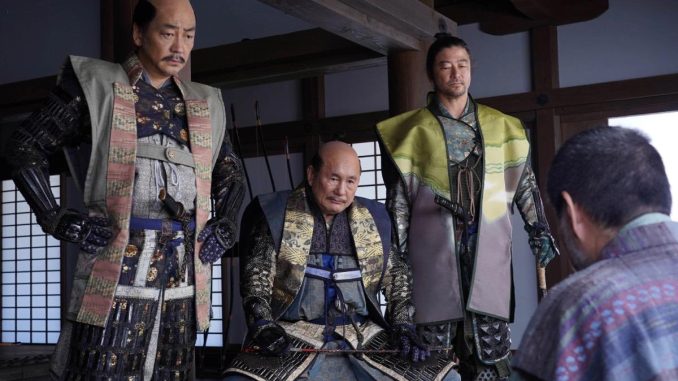
Wednesday at Sitges 2023 was a day for dark humor, sometimes unexpected and sometimes not. The day started off with a monster of Japanese cinema: Takeshi Kitano’s new film, Kubi subverts the classic samurai story with lots of blood, beheadings and satire. Kitano’s trajectory and status clearly allow him to do whatever he wants to do and it’s obvious that this movie was a lot of fun for him. This, of course, also reflects in the audience. Nevertheless, for anyone expecting something deeper, a greater meaning, a bold story, Kubi might be disappointing.
Right after Kitano we jump to the next cinema where the presentation of Hundreds of Beavers takes place. Director Mike Cheslik, who also co-wrote Lake Michigan Monster (2018) and the main actor Ryland Brickson Cole Tews are there to present the movie and although they say to be very glad to take part in this “very serious film festival” it’s clear that their intentions are not serious at all. Attired with a huge raccoon hat, as in the movie, Ryland Brickson begins the presentation falling in the middle of the stage. Right after that something starts lurking from the back of the room and soon starts a live wild beaver hunting. An hilarious show just as a bit of what we will witness for the next few hours on screen.
Hundreds of Beavers combines the Looney Tunes aesthetic with video game elements in a silent black and white film. Witty, and unpretentious, the story follows an applejack salesman struggling to become a great fur trapper to be able to marry his love. For this, he will have to do just what the titles suggest: defeat hundreds of beavers. With that in mind, Hundreds of Beavers offers a great spectacle for anyone looking for simplicity, mimic and fun. For me personally, the theme and aesthetic got relatively monotonous after a while. But the film’s personality and its combination of elements make it worth a try.
In the afternoon, we search for more laughter and this time they come from Estonia. The Invisible Fight is a kung-fu supernatural comedy set at the border of the Soviet Union and China in the 70s. Right from the beginning the combination of Black Sabbath and gregorian chants, the 70s kitschy looks and the monk tunics convince us of a great scenography. Private Rafael is the only survivor of a kung-fu attack at his post at the border. Right after the episode he becomes fascinated by his fighters and decides to give himself to the martial arts. Years later, he enters a buddhist monastery to perfect his style only to realize that the spiritual path won’t be an easy one. The Invisible Fight looks just great and is entertaining from the beginning. The narrative might be too diluted sometimes to offer a clear big picture of what the movie’s offering. Nevertheless, the story gives us enough iconic moments to forgive that.
Last but not least, tonight the Auditori screens Yorgos Lanthimos’ last film: Poor creatures. It’s funny how most directors simplify his style as they grow, and opt for more minimalistic forms and darker styles. Yorgos Lanthimos’ case is just the opposite. With Dogtooth and Lobster, the Greek director got us used to dark sceneries and minimalism to tell stories open for interpretation. Poor Things, on the contrary, might be Lanthimos’ most excessive and optimistic film. A bit in the line of Alice in Wonderlands, the story follows Bella Brixton, a young woman grown in a privileged context, but as a part of a very unconventional scientific project. As Bella grows up, she is convinced to go out and explore a world that is fantasy and horror in equal parts. From the beginning to the end we are just unable to detach from the character, as her heartwarming intentions and honesty reveal the darkest side of the world, but also our role to make it better. Poor Things is an original piece of fantasy and might be Lanthimos greatest job to date. Fun, thought-provoking and just wonderful.




